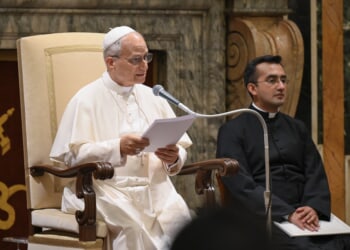Not having several months and six thousand words, this morning’s humble editorial is not going to top Will Lloyd’s tour de faiblesse of Kemi Badenoch’s leadership. If you haven’t yet read it, do. But I can add an amusing little coda to it, for I almost appeared in it.
“Bizarrely you have come up in my reporting”. Never a fun message to get, especially in the morning. He wants to chat. Panic grapples with brain fog: I don’t have enough money to have done anything exciting with it, ConHome employs no interns whose tender Gen Z sensibilities I might have offended…
“It’s nothing bad and I’m not going to put your name in piece. Just want to know if it’s true or not”. Reassured, and sporting a fresh bruise on my ego, I take the call. What (barring the odd contribution) could possibly have put me on the radar of the New Statesman?
The answer, it turns out, is that several members of Kemi Badenoch’s “outer circle” have told Will that I, personally, invented the idea that she wasn’t going to make any big policy announcements for two years.
I burst out laughing, and for the remainder of a fairly long and thoroughly-enjoyable conversation I didn’t really stop.
This isn’t the first time this idea has come up. I was personally challenged on it by a senior member of Badenoch’s team at another magazine’s drinks after we included a question on the delay in our monthly survey earlier this year. Yet here is a report from the Sun dated January 8:
“Kemi Badenoch will not reveal any major policies for at least two years as she orders the Conservatives to be ready to fight an election by 2028. The Tory leader unveiled her “three year plan” to turn the routed party around at Shadow Cabinet meeting on Tuesday that leans heavily on Sir Keir Starmer’s own path to power.”
That same afternoon the Guardian picked up the story and quoted a Conservative spokesperson as saying “we’re not setting out the fine details of those because we’re not creating policies for 2028 in 2025.”
Now I am the last person ever to deprecate the awesome power of the ConservativeHome survey. But I don’t think I’m spilling any secrets when I confess that it does not, to my knowledge, so warp reality as to mislead the political correspondents of national newspapers writing weeks before it goes out to our panel (or indeed, prevent party spokespeople saying “She said no such thing” when asked about two-year policy delays).
One can see why this might have been squeezed out of the final copy in Lloyd’s report. But it is nonetheless a fascinating little insight into LOTO that several people in it sincerely believe a journalist invented something that their principal told the Shadow Cabinet, to national press coverage, in January. Even if Badenoch herself wasn’t on hand to clear it up, Google would have.
To be clear, there is no shame in a u-turn if done for the right reasons. Holding off on policy announcements until the latter half of this Parliament was never going to be possible, a point illustrated well by Badenoch’s announcement of a new policy on Indefinite Leave to Remain; Opposition is for the most part the business of saying things, and without a programme a party has little to say.
Ditto the abandonment of another of her January announcements – this one not, to my knowledge, memory-holed by LOTO – that there wouldn’t be a Shadow Cabinet reshuffle this side of a general election. That was an unwise pledge, not to mention a needless hostage to fortune, and we should recognise the wisdom in abandoning it.
There is, however, a niggle. One of the reasons it was an unwise pledge is that Badenoch’s original shadow cabinet was drawn up without reference to a policy programme, because she was elected leader on a platform of not yet having one. It was obviously going to be the case that, as that platform developed, she would need to recalibrate to ensure that each brief was held by someone who supported her particular vision for it.
Yet Badenoch can’t yet do that because her programme still does not yet exist; the progress of the policy review appears, shall we say, incremental. (Apparently the plan is that the Shadow Cabinet will be able to present the party’s understanding of the problems – the problems – at Party Conference in October.) It is therefore not surprising that this was not a grand, year-zero reshuffle.
Nor, however, was it merely a de minimis reorganisation to account for the departure of Ed Argar, who has stood down for health reasons. The main press line has been the return to combat of Sir James Cleverly, stepping into the housing brief to take on Angela Rayner.
A changing of the guard at that post is not unwarranted; Kevin Hollinrake, Cleverly’s predecessor, in a recent speech to the ConservativeYIMBY group apparently declared himself a YIMBY and then complained that his local housing targets were too high. But taken together with a couple of other senior changes, such as Richard Holden to transport, it makes the decision to retain the services of Priti Patel – she who asked to be thanked for the Boriswave – look like, well, an actual decision.
Of course, the above analysis assumes that it would be possible to unite the parliamentary Conservative Party around any sort of bold agenda, and that is at least an open question at this point.
Badenoch’s decision to stand for the leadership on a policy-lite prospectus was tactically canny, for that was the only way she could assume the mantle of unifier. Her experience in the Sunak Government ought to have taught her that unity without momentum is a very limited virtue; but the only path to momentum lies in fighting an internal battle and winning it, and that she is in no position to do.
As such, it is difficult to take seriously this morning’s report in the Financial Times that Badenoch intends to take as her template Javier Milei, the chainsaw-wielding, libertarian president of Argentina. According to the Cato Institute, Milei has cut Argentine government spending by 30 per cent; just this month he picked a very public fight with the legislature to oppose a major pension hike.
What would a 30 per cent cut in government spending look like? Could she get such a programme through the Shadow Cabinet? Indeed, given her position on the Winter Fuel Allowance – the world’s most defensible cut – could she get it past Kemi Badenoch?
In her interview, the Leader insists that: “It’s not about cutting bits of the state.” This sounds a lot like her line in November, when she told Laura Kuennsberg that cutting taxes “doesn’t mean that we have to cut public services”. But it did then, and even a Milei-lite programme certainly would now. As John Oxley has written, we already tried cutting spending without cutting services under George Osborne – and the result was ‘Sh*t-State Toryism’.
During that one conference when Liz Truss was prime minister, various spads and I played a little game where we tried to calculate how she could find £45bn in savings to offset her tax cuts, as she had then promised to do, and survive the effort. We did not succeed. The same number for ‘doing a Milei’ on Britain’s public finances would, according to the OBR’s figures for 2024/5, be £383.58bn; cutting by just ten per cent would be just shy of £128bn.
Play it yourself at home – and why not submit the fruits of your efforts to the Party’s policy review?
On one level, it feels unfair to attack Badenoch for this. She’s not wrong, after all; entitlement spending is eating British government from the inside out, and only eye-watering cuts to revenue spending can change our economic trajectory. But not only is there no evidence that the public is ready to hear that message, there’s scant evidence the Tories are convinced of it themselves.
Milei is just another totem, an image to wave in front of the faithful, his teachings an afterthought. People trying to see in Badenoch the next Margaret Thatcher miss the point – we haven’t had the next Sir Keith Joseph yet.
Perhaps I will be eating these words in five years time (in which case, I’ll regret making this piece quite so long). But the auguries aren’t promising. To bring us full circle, the FT interview also sports another of LOTO’s strange denials:
“Badenoch has often been defined in the media – unfairly, she claimed – for her tough language on cultural issues such as trans rights or immigration, but she said her overriding focus now was on the economy – a demand of shadow cabinet members.”
If the leader has been unfairly framed as focused on cultural issues, the problem goes right to the very top. For who was it who told May’s Welsh Conservative conference that: “Something is changing in the whole world. We are moving away from the politics of the economy to the politics of identity”? A line echoed, incidentally, by senior members of her team in private conversation?
That’s right – it was Kemi Badenoch.



![Former Bravo Star Charged After Violent Assault Using a Rock-Filled Sock in Tennessee Walmart [WATCH]](https://www.right2024.com/wp-content/uploads/2025/07/Former-Bravo-Star-Charged-After-Violent-Assault-Using-a-Rock-Filled-350x250.jpg)



![Illegal Alien Walked Free After Decapitating Woman, Abusing Corpse for Weeks [WATCH]](https://www.right2024.com/wp-content/uploads/2025/07/1753013138_Illegal-Alien-Walked-Free-After-Decapitating-Woman-Abusing-Corpse-for-350x250.jpg)
![NYC Man Snatches Child Off The Sidewalk, Parents Chase Him Down [WATCH]](https://www.right2024.com/wp-content/uploads/2025/07/NYC-Man-Snatches-Child-Off-The-Sidewalk-Parents-Chase-Him-350x250.jpg)
![Man Arrested After Screaming at Senators During Big Beautiful Bill Debate [WATCH]](https://www.right2024.com/wp-content/uploads/2025/06/Man-Arrested-After-Screaming-at-Senators-During-Big-Beautiful-Bill-350x250.jpg)
![Leftists Lose Their Minds After Jason Kelce Celebrates Being an American [WATCH]](https://www.right2024.com/wp-content/uploads/2025/07/Leftists-Lose-Their-Minds-After-Jason-Kelce-Celebrates-Being-an-350x250.jpg)






